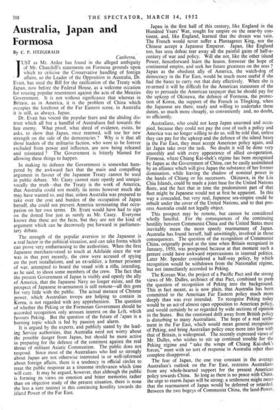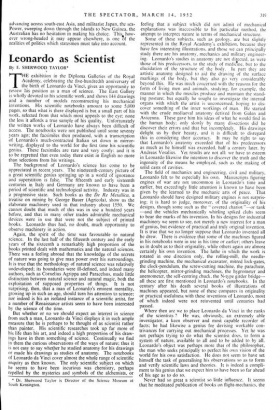Australia, Japan and Formosa
Canberra.
11 UST as Mr. Attlee has found in the alleged ambiguity of Mr. Churchill's statements on Formosa grounds upon which to criticise the Conservative handling of foreign affairs, so the Leader of the Opposition in Australia, Dr.
Evatt, has used the Bill for the ratification of the Treaty with Japan, now before the Federal House, as a welcome occasion for rousing popular resentment against the acts of the Menzies Government. It is not without significance that whereas in Britain, as in America, it is the problem of China which occupies the forefront of the Far Eastern scene, in Australia it is still, as always, Japan.
Dr. Evatt has voiced the popular fears and the abiding dis- trust which all but a handful of Australians feel towards the late enemy. What proof, what shred of evidence, exists, he asks, to show that Japan, once rearmed, will use her new strength on the side of the democracies ? Why is it that all those leaders of the militarist faction, who were to be forever excluded from power and influence, are now being released and reinstated ? The Government is bitterly blamed for allowing these things to happen.
In making its defence the Government is somewhat ham- pered by the awkward fact that the main and compelling argument in favour of the Japanese Treaty cannot be used in public debate. Mr. Casey cannot state openly and unequi- vocally the truth—that the Treaty is the work of America, that Australia could not modify its terms however much she may have wanted to, and that, unless Australia was prepared to take over the cost and burden of the occupation of Japan herself, she could not prevent America terminating that occu- pation on her own terms. Dr. Evatt would have had to sign on the dotted line just as surely as Mr. Casey. Everyone knows that these are the facts, but they are not the kind of argument which can be decorously put forward in parliamen- tary debate.
The strength of the populir aversion to the Japanese is a real factor in the political situation, and can take forms which can prove very embarrassing to the authorities. When the first Japanese merchant-vessel to touch at Adelaide since the war was in that port recently, the crew were accused of spying on the port installations, and an ex-soldier, a former prisoner of war, attempted to board the vessel with a rifle, intending, as he said, to shoot some members of the crew. The fact that the present Government of Japan is visibly and openly the ally of America, that the Japanese Navy no longer exists, and the prospect of Japanese re-armament is still remote—all this goes for very little with the public. The actual menace of Chinese power, which Australian troops are helping to contain in Korea, is not regarded with any apprehension. The question of whether the Peking or the Formosan Government should be• accorded recognition only arouses interest on the Left, which favours Peking. But the question of the future of Japan is a burning topic which is fed by passion and alarm. It is argued by the experts, and publicly stated by the lead- ing Service authorities, that Australia need not worry about the possible danger from Japan, but should be more active in preparing for the defence of the continent against the real threat of militant Asiatic Communism. The public does not respond. Since most of the Australians who feel so strongly about Japan are not otherwise interested in or well-informed about foreign affairs, there is a tendency in official circles to treat the public response as a tiresome irrelevance which time will cure. It may be argued, however, that although the public is forming its views on emotion and bitter memories rather than on objective study of the present situation, there is none the less a sure instinct in this continuing hostility towards the island Power of the Far East. Japan in the first half of this century, like England in the Hundred Years' War, sought for empire on the near-by con- tinent, and, like England, learned that the dream was vain. The French would never suffer a Plantagenet King, nor the Chinese accept a Japanese Emperor. Japan, like England too, has seen defeat tear away all the painful gains of half-a- century of war and policy. Will she not, like the other island Power, henceforward learn the lesson, forswear the hope of continental empire, and seek her future greatness on the seas ? Japan as the obedient ally of America, the watch-dog of democracy in the Far East, would be much more useful if she had the bases to carry out that duty effectively. When she is re-armed it will be difficult for the American statesmen of the day to persuade the American taxpayer that he should pay for the upkeep of Okinawa, the defence of Formosa, the protec- tion of Korea, the support of the French in Thigking, when the Japanese are there, ready and willing to undertake these duties, so much more cheaply, so conveniently and, no doubt, so efficiently.
Australians, who could not keep Japan unarmed and occu- pied, because they could not pay the cost of such a policy and America was no longer willing to do so, will be told that, unless they can pay for the upkeep and the defence of the island bases in the Far East, they must accept American policy again, and let Japan take over the task. No doubt, it will be done very smoothly and with every appearance of allied co-operation. Formosa, where Chiang Kai-shek's regime has been recognised by Japan as the Government of China, can be easily assimilated by an alliance which will give Japan the substance of her former domination, while leaving the shadow of nominal power in the hands of Chiang or his successors. Okinawa, in the Liu Chiu Islands, could be made a joint base for the United Nations fleets, and the fact that in time the predominant part of that fleet might be Japanese would not at first be apparent. In this way a concealed, but very real, Japanese sea-empire could be rebuilt under the cover of the United Nations, and to that pro- cess Australia could not legally object.
This prospect may be remote, but cannot be considered wholly fanciful. For the consequences of the continuing hostility between Communist China and the United States must inevitably mean the more speedy rearmament of Japan. Australia has found herself, half unwittingly, involved in those consequences. The question of the recognition of Communist China, originally posed at the time when Britain recognised in January, 1950, was postponed because at that moment such a gesture could have awkward repercussions in internal politics. Later Mr. Spender considered a half-way policy, by which recognition would be withdrawn from the Nationalist regime, but not immediately accorded to Peking.
The Korean War, the project of a Pacific Pact and the strong views of Mr. Dulles, architect of that Pact, combined to push the question of recognition of Peking into the background. This in fact meant, as is now plain, that Australia has been committed to the American Far Eastern policy much more deeply than was ever intended. To recognise Peking today would be an act,of almost open opposition to American policy, and would certainly be so regarded by wide sections of opinion in the States. But the continued drift away from British policy is disturbing to many Australians. The hope of a real settle- ment in the Far East, which would mean general recognition of Peking, and bring Australian policy once more into line With that of Britain, is widespread. The recently expressed views of Mr. Dulles, who wishes to stir up continual trouble for the Peking regime and " take the wraps off Chiang Kai-shek's forces," meet with no sort of response in Australia other than complete disapproval.
The fear of Japan, the one true constant in the average Australian's outlook on the Far East, restrains Australians from any whole-hearted support for the present American policy towards China. So long as there is no peace with China, the urge to rearm Japan will be strong; a settlement might mean that the rearmament of Japan would be deferred or retarded. Between the two bogeys of Communist China, the land-Power, advancing across south-east Asia, and militarist Japan, the sea- Power, sweeping down through the islanlis to New Guinea, the Australian has no hesitation in making his choice. This. how- ever wrong-headed it may appear elsewhere, is one of the realities of politics which statesmen must take into account.











































 Previous page
Previous page